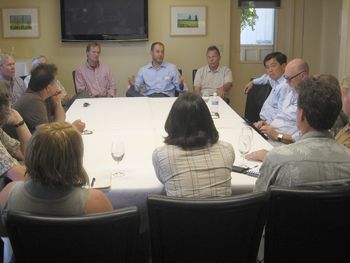Straight Talk at Roundtable

By Karl Klooster
Decisions on the national level can have a significant impact at the local level. And that certainly seems the case these days with the wine industry.
Although endeavoring to influence the process through paid advocates in Washington is a necessity for any special interest group these days, directly gaining the ear of one’s elected representative remains the top priority. That’s how members of the Willamette Valley Wineries Association ended up sitting down with U.S. Rep. David Wu, a Democrat representing Oregon’s 1st Congressional District.
The conference room at Sokol Blosser Winery in Dundee was filled to overflowing with winery owners and Oregon Wine Board staffers, who were joined by reporters from the News-Register and Oregon Wine Press.
The audience included Alex and Alison Sokol Blosser, David Adelsheim, Ken Wright and Rob Stuart, whose wineries all carry their last names, along with Laurent Montalieu of Solena, Grand Cru Estates and NW Wine Co., Leigh Bartholomew of Archery Summit and Domino IV, Brian O’Donnell of Belle Pente, Harry Peterson-Nedry of Chehalem Wines and Bill Sweat of Winderlea. The discussion lasted a little over an hour, with subjects ranging from rail access to research, immigration and direct shipping legislation.
Not surprisingly, labor and immigration issues dominated. However, Ken Wright took the opportunity to inform the congressman of a much more local and low-profile issue also crying out for near-term action.
Emphasizing the eventual need for a Yamhill Valley connection to Portland’s Max light rail line, Wright advised Wu that the Union Pacific Railroad intends to sell 17 miles of right-of-way between McMinnville and Hagg Lake.
“It’s the least expensive line to develop,” he said. “Abandoned tracks are already in place from Hagg Lake to Cornelius, so it provides a direct route all the way from Mac to the nearest light rail access.”
He went on to mention that, owing to lack of buyer interest, the railroad had reduced the asking price from $9 million to $4 million. But once it is parceled into private hands, there will be no way to put it all back together again, he said.
“It would be a fabulous opportunity both for freight and commuters, as well as increasing tourism, to the area big time,” Wright said. He noted there has been some ongoing dialogue about this with the railroad, but it needs to see some concrete movement in that regard.
Saying prospects for federal funding are “challenging” right now, Wu advised continuing the conversation to build local support in both the public and private sectors. He said he’d follow up by seeing what he could do during the next session.
With that, the group launched into the immigration issue.
All in attendance expressed concern about recent actions to clamp down on illegal immigration. The consensus was that a significant reduction in the availability of field labor would have a highly detrimental affect on all agricultural products requiring hand harvesting, including grapes.
Montalieu said, “I think there is an incredible disconnect between what is being pushed in Washington, D.C., and what we know the problem to be here.”
“These are highly skilled people,” Adelsheim said. “There’s no way to easily replace them.”
Peterson-Nedry said, “Society is culpable. We’ve raised a couple of generations of Americans who won’t do the kind of work immigrants are happy to have.”
Bartholomew agreed, saying, ”They’re not taking jobs away from anyone, but now they’re caught in an impossible position. Even those who have green cards are afraid to go back to Mexico to visit relatives.”
“Something has to be done,” Alex Sokol Blosser said. “There has to be some simple, straightforward way for immigrants to gain citizenship. We know people who have tried to do it through the system for years without success.”
Wu assured the group he understands the crucial nature of the immigration issue and agreed the H-2A visa program wasn’t doing the job.
He expressed his own frustration, however, with the intransigent mindset of some members of Congress. “They have very divergent views,” he said.
That being the case, he told wine industry representatives, “You have to continue to make your case in the strongest and most logical terms. We may not be able to address it in this session, but let’s see what we can to do in the next.”
As for the highly contentious HR 5034, designed to return control of direct wine shipping to the individual states, Wu made clear his adamant opposition to the bill. He said he didn’t think it was going anywhere this session, but cautioned, “You never can tell what could happen next session.”












